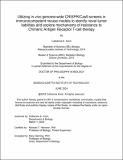Utilizing in vivo genome-wide CRISPR/Cas9 screens in immunocompetent mouse models to identify novel tumor liabilities and explore mechanisms of resistance to Chimeric Antigen Receptor T-cell therapy
Author(s)
Koch, Catherine E.
DownloadThesis PDF (41.27Mb)
Advisor
Hemann, Michael T.
Terms of use
Metadata
Show full item recordAbstract
Despite significant advancements in the understanding of cancer and the development of countless novel therapeutic modalities, resistance and relapse remain persistent and pervasive issues across tumor types even in the setting of cutting-edge treatments. The situation is particularly dire for tumors like glioblastoma (GBM) where most patients, even with standard of care treatment, are dead within 1 year of diagnosis. This lack of effective treatment for GBM reflects formidable challenges to therapeutic design including vast intra- and inter-tumoral heterogeneity, highly invasive growth patterns, and a hostile, immunosuppressive tumor microenvironment (TME). Fortunately, with the advent of CRISPR/Cas9 screening platform technologies, mechanisms of treatment resistance and novel therapeutic target identification can be efficiently interrogated in an unbiased, high-throughput manner. Furthermore, adaptation of these platforms for use in vivo allows for screens to be conducted in models capable of more accurately recapitulating the complexities of clinical disease. Even more importantly, these results may reveal unique tumor dependencies that would go unnoticed in vitro, potentially leading to more clinically relevant insights.
This thesis details the results of 3 genome-wide pooled CRISPR/Cas9 screens conducted in parallel in vitro and in vivo in immunocompetent murine models of GBM or B-cell Acute Lymphoblastic Leukemia (B-ALL). Importantly each screen is the first of its kind with no prior genome-wide screens having been conducted in vivo in an immunocompetent murine model of GBM. The 2 screens conducted in GBM sought to better understand fundamental in vivo specific dependencies of GBM tumors in order to identify potential novel therapeutic targets or explore mechanisms of resistance to Chimeric Antigen Receptor T-cell (CAR-T). Prior to conducting these screens, no identified murine GBM models were suitable for in vivo CRISPR/Cas9 screening, thus, a modified model was generated, the details of which are also included in this thesis. Results from these screens highlighted the heme biosynthesis pathway as an in vivo specific dependency and potential novel therapeutic target. In addition, processes of cell motility and migration were implicated in promoting resistance to CAR-T therapy in GBM. The third screen conducted in B-ALL sought to explore mechanisms of resistance to CAR-T therapy and in doing so identified interferon gamma pathway components, including downstream target Qa-1b, as important mediators of resistance to CAR-T therapy in vivo. Interestingly, for all screens, comparison of in vivo and in vitro results highlighted distinct biological processes with little to no overlap in hits. In addition, while each screen produced unique results the same iterative screening workflow and novel, small-pooled genome-wide guide RNA (gRNA) library were utilized. Ultimately, the ability of this screening workflow to produce robust results for different conditions and mouse models highlights its versatility and potential broad applicability. From a therapeutic standpoint, insights derived from this collection of screens could aid in guiding development of novel treatment strategies for GBM and synergistic CAR-T combination therapies to improve efficacy in the setting of GBM or B-ALL. Additionally, deeper mechanistic exploration of these datasets could yield a better understanding of the complex nature of GBM biology and insight into the function of CAR-T therapy across both hematologic and solid tumor settings.
Date issued
2024-05Department
Massachusetts Institute of Technology. Department of BiologyPublisher
Massachusetts Institute of Technology